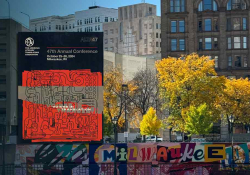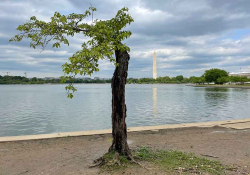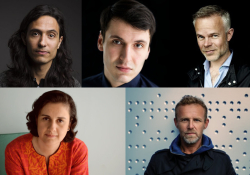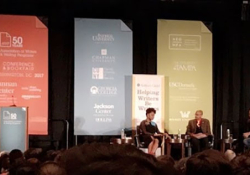Follow the News
In 2007 Persian English translator and writer Raha Namy set off on a bicycle ride through Syria, Lebanon, and Jordan, coming to a stop at the Occupied Territories of the West Bank (Israel). She and many women from a variety of countries pedaled together; their hope for the trip was to consider a horizon of possibilities for women and for peace in the Middle East. Namy writes of her encounters with soldiers, with Syrian first lady Asma al-Assad, and with a peaceful man whom she later realized to be a powerful figure. Banners in Syria hailed the group of cyclists as “women on the road to peace”—here Namy speculates on this road, wondering what her ride accomplished, asking how possibilities exist for some women and not for others.
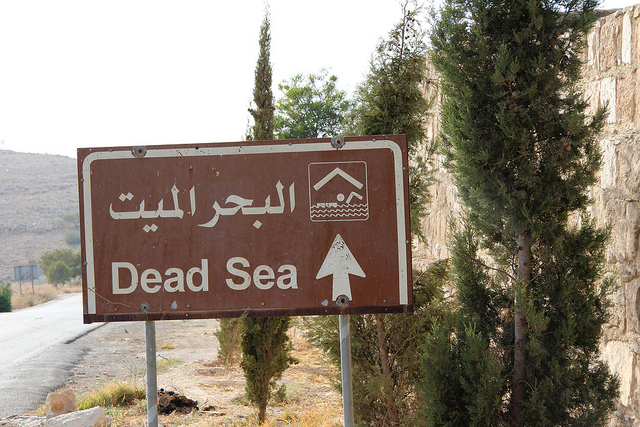
Sitting at the hotel bar, drinking a freshly brewed black tea, smoking a cigarette. This is the last day. Goodbyes have started. We are staying a few days longer in Damascus. Tomorrow a few of us want to go to Zeinab’s Mausoleum. Two of us want to head to Ma’loula Village. I feel a presence behind me. He asks whether he can join me. I nod yes, pointing to the stool next to me.
“I hope the cigarette doesn’t bother you,” I say.
“Is everything okay?” he asks.
I take another puff at my cigarette. I look around at the hotel lobby, at the women gathering in small and large groups. I want to run away. I want to stay. I want to cry.
“It’s going to be hard to go back to reality,” I say, whispering, as if talking to myself.
He is the one nodding this time. He sits with me for a while. In silence, we both stare at the scenes around us. Women hugging. Women writing down contact information. Women taking pictures. We search inside ourselves or far beyond the walls of the hotel in the history of the future that we’ve been here to hopefully rewrite.
He is the public relations director of Areeba, now mobile telecom company MTN Group, the main sponsor of this event which helped create a wonderful memory of the land for us. One of the calmest, most peaceful men I’ve ever met. A Christian, with a baby girl recently born. Some of the girls have developed crushes on him. I like him. He is composed. He is in command. His gaze intersperses all without making his presence felt.
Hundreds of women from around the world, we have come together to ride our bikes through Syria, Lebanon, Jordan, and (some of us) through the Occupied Territories of the West Bank (Israel). We want to promote peace, painting a different horizon of possibilities. This is the second time the ride has taken place. It is my first time to take part. The ride starts on April 7, 2007. The number of my bike tag is seven, a sacred number. I and many others believe that what we are doing is sacred, means something, can bring change. Today, I am no more the naïve, hopeful believer I was back then. The ride becomes my last.
Today (or as late as a year ago), that peaceful, calm guy is assistant to Asma al-Assad, Bashar al-Assad’s wife. That guy is the one who demanded that Twitter close several accounts said to belong to Bashar Assad.[1] Since the ride has begun in Syria, Asma al-Assad rides with us on one of our first days. In a light gray and white top and matching leggings, she pedals alongside us, stops and talks with us and her countrywomen. The countrywomen bake bread in ovens by the road and offer us some. The bread is spiced with the delicious, somehow bitter za’atar. Bodyguards ride and stand at a distance. Asma al-Assad is beautiful and peaceful. When we meet her, we have just descended roads meandering through heavenly hills veiled within a light mist, some too steep for us to pedal up, forcing us to get off the bikes and continue on foot. When we meet her, we are high on the scent of sour orange blossoms flowing all over the roads. We all get on our bikes and pedal together for a while. We. She. The scent of the flowers. Hope-inspiring, her presence remains, however, only at the level of the symbolic—beautiful for the news, for the media that cover us. Though we are women standing together for the same cause, the first lady parts ways with us when we reach the port city of Latakia and the Mediterranean Sea.
Syria, Lebanon, and Israel each have a share of the sea. But not the West Bank. There are young women from the West Bank riding with us, women for whom home is a refugee camp. Young Syrian women in traditional dresses, pink and blue and red, are dancing to live music. A large crowd circles around them. Women from the West Bank walk away toward the sea. They have not seen it, touched it, smelt it. Ever. In years. The West Bank has no access to water. People of the West Bank cannot travel as others do. The women cannot simply pack their things for a fun weekend at the beach. Leaving the borders and coming back is not easy. For these women, though, the problem is not just in leaving the borders: for them, even moving within the borders is a matter of restrictions and permissions, they tell us. They constantly have to go through barricades and be checked at checkpoints. Moving around, inside or outside one’s land, is not simply a decision of one’s own when governments are fighting over imaginary lines on the land.
Our group is riding its bikes to bring attention to such issues. Our group’s English title is “Follow the Women” (FTW). The banners in Syria call us نسا علی طریق السلام –in English, “Women on the Road to Peace.” “Peace” is the English equivalent for the word السلام Salam, which is also the greeting used daily in Arabic and in Persian, simply meaning “hello.” The response is سلام علیکم , or Salam Alaikom: hello to you, peace be upon you. Greeting the other is a wish for peace—for the self and for the other.
Women are constantly struggling for peace. Women are integral pieces of the puzzle that makes up the map of the world peace. Women are constantly mutilated into pieces, for one reason or another. All around the world. To feel peaceful on the world map of the noble and the beautiful, women are constantly paying for pieces of luxury.
Private e-mails from the Assad family leaked in 2012 revealed the Syrian first lady spending extravagantly on luxurious furniture, jewelry, and clothing just as the first flames of the conflict in Syria was becoming news in 2011. In an e-mail to Azmi Mikati, the nephew of the Lebanese prime minister, Asma confessed to having taken an online personality test revealing her to be a “monster.”[2] In another email to Mr. Mikati (Dec. 14, 2011), Asma al-Assad noted in reference to her relationship with Mr. Assad, “I am the REAL dictator, he has no choice.”[3] In an email to Mrs. Assad (Feb. 5, 2012), Bashar al-Assad, using the pseudonym Sam, sent his wife lyrics of a western song by Blake Shelton, the first lines of which read, “I’ve been a walking heartache / I’ve made a mess of me / The person I’ve been lately / Ain’t who I wanna be.”[4] In an email to the president (Dec. 28, 2011), Asma al-Assad wrote, “If we are strong together, we will overcome this together. . . . I love you.”[5] These leaked emails caused an international uproar against her and the Assad family, and Asma al-Assad joined her husband on a European Union sanctions blacklist.[6]
Love of the family vs. love of the people vs. love of power. Politics of intimacy vs. politics of nationality vs. politics of governing. Why do we expect Asma to walk away from her man for the sake of other men? From her children for the sake of other children? From her life for the sake of the lives of others? Why do we expect the love and avarice for power to suddenly disappear? Why do we expect the complexities of politics to suddenly disappear? Why are we surprised by Asma’s emotions and language? Why do we expect a woman not to be as much of a tyrant as a man?
Asma is called by Vogue magazine, in the February 2011 article “A Rose in the Desert,” “glamorous, young, and very chic—the freshest and most magnetic of first ladies.”[7] The Syrian conflict starts around March 2011. Today, the online links to the article lead us to the message, “Oops, the page you’re looking for cannot be found.”[8]
On our ride in 2007, we leave Asma and Syria behind and head to Lebanon and Jordan. At the Syria - Lebanon border, we wait for hours for our visas. Over the asphalt no-man’s-land of a border that keeps silent under an always-temporary peace, we decide to spread our banner of peace, a gift from the Iranian team, and ask strangers and travelers to jot down their thoughts. The banner is a piece of white cloth with the FTW logo in the middle that we hope to fill with words on our togetherness and our hopes for peace. Some participants have already written a few words on it on our first night in a hotel in Aleppo. One of us asks the soldiers standing watch to share something.
“As soldiers, we are not to make comments on peace,” one of them responds.
I don’t know how true that is, but that is what I have written under a picture of him and a few other soldiers glued in my scrapbook of the ride. After a few minutes, he writes down his phone number on a small piece of paper and hands it to the same woman who has asked him for a note on peace.
We ride and stay in Lebanon and Jordan for six days. The two countries welcome us, offering different yet dauntingly similar and haunted narratives of wars and politics, officials and peoples, wealth and power, humanness and friendship—all interrelated, forever inseparable. Narratives that await being told at another time, in another story. In Jordan, the country sharing borders with Palestine/Israel, we—the Iranians, the Syrians and the Lebanese—have to say goodbye to the rest of the team who will continue to ride into the center of the conflict. The Iranian government bans Iranian citizens from traveling to the Occupied Territories. Riding for peace in the Middle East, we from the Middle East are left behind, while the foreigners continue with the journey. The note in my scrapbook from that night reads, “This is the end of our unity.”
We spend the last day together on Mount Nebo, looking down on the Jordan Valley and the Dead Sea, lighting candles and saying prayers, staring up at the tall metal cross that looks more like an erected serpent than a religious symbol. At lunch we dance and laugh. After lunch, we sit silently to listen carefully to the FTW founder discuss the security issues for the last part of the ride in Palestine—in Israel. Two names. One land. Two countries. Two realities. Two dreams. The conflict for peace begins in the names. These are my notes from the talk: “Palestine is just another world, something you can’t imagine, something you have not lived. . . . We want to make it as easy as possible with the soldiers and the checkpoints, so carry as little as you can, talk as little as possible, and give only necessary information.” Others head to Jerusalem. We stay in Jordan. The banner that now bears the words “A Gift from the Iranian Team,” as well as hundreds of words about peace and solidarity written by women of all ages and countries, goes forward to march with the women on the streets of Jerusalem until it reaches the Wall. On the Wall, the women paint the FTW logo: three women bikers pedaling on a curved path that is a branch, perhaps an olive branch, under which a bird—perhaps the pigeon of peace—flies, and over which the sun shines. The women paint themselves over the “grey monster snaking its way through the landscape.”[9]Other graffiti writing on the Wall reads: “Israel, have you become the evil you deplored?”; “Zionism is Fascism”; and “To exist is to resist.”[10]
The two pages dedicated to Palestine in my FTW scrapbook are blank. They carry only the dates, the location, and: “This is our experience of Palestine. Blank. None.” It becomes a hole inside us that we carry with us as we end our journey, going from Jordan back to Syria, to Tehran, and later, to the countries we move to for one reason or another. The hole becomes part of us, traveling with us through time, through different geographies. Of the Syria of those days, nothing remains but our memories, hundreds of pictures, a few souvenirs, and some friends on Facebook who are, like us, no longer the same young women of a few years ago. The Asma of that day seems to have evaporated into thin air. Perhaps she was an illusion from the very beginning.
“The weight of your own killed / a weight which closes / innocence for ever / because they are so many.”[11] This weight keeps creating in us and in many others in this region a sense of despair, “the sense that your life and the lives of those close to you count for nothing.”[12] A despair hard to imagine for those living in the other world. Our rosy naïveté of those years has been reduced to ashes under the weight of the reality of the region, under the weight of the news. But our despair is nonetheless “undefeated,”[13] allowing us to continue to fight the monsters, internal and external, inside and outside the borders. Of one of the Syrian girls of those days, I vividly remember the laughter and the یعنی s, the “I mean’s” they interspersed here and there in-between words as if to remind herself and me, “I talk to you wishing for my meaning to be understood.” Back then, I thought it was her thing, this use of یعنی . I realize now it is not. In an interview, Hala Mohammad, a Syrian poet now living in exile in Paris, constantly uses the word as if to say, “My words are my meaning.” In her poem “To the Homeland” she writes, “The Taste of Salt is in my memory / It’s between the street and the house / All roads / Lead to Heaven.”[14]
Where and what is Hala’s and other Syrian women’s heaven? The roads once scented by orange blossoms? The shawarmas and glasses of faraweleh once devoured on a sidewalk next to the Omavi Mosque? The Aramaic words of Christ once heard in the village of Ma’loula? The satellite dishes once hanging over the rooftops or behind the windows of the houses in Damascus? The colorful, gorgeous fabrics humbly showing themselves off to tourists in Aleppo’s bazaar? Is heaven—for her, for them, and for us—memories of once upon a time, once upon a place? Is heaven home, or simply an imaginary, promised time and place in a life after death?
Denver, Colorado
[1] Robert Booth, Mona Mahmood, and Luke Harding, “Exclusive: Secret Assad emails lift lid on life of leader’s inner circle,” The Guardian, March 4, 2012, accessed June 13, 2013.
[2] “Assad Emails: Asma Tells Friend “I’m a Monster” After Doing Online Personality Test,” The Telegraph, March 23, 2012, accessed June 13, 2013.
[3] Alex Spillius, “Syria: ’I am the Real Dictator’, Declares Asma al-Assad,” The Telegraph, March 18, 2012, accessed June 13, 2013.
[4] Robert Booth and Luke Harding, “Gilded Lifestyle Continued for Assad Coterie as Conflict Raged in Syria,” The Guardian, March 14, 2012, accessed June 13, 2013.
[5] Spillius, “Syria: ‘I am the Real Dictator’, Declares Asma al-Assad.”
[6] Ellie Krupnick, “Asma Assad Added to EU Sanctions Blacklist After Controversial Spending Revealed,” The Huffington Post, March 20, 2012, accessed June 13, 2013.
[7] Noreen Malone, “The Middle East’s Marie Antoinettes,” Slate, March 23, 2011, accessed June 13, 2013.
[8] Vogue, accessed June 13, 2013.
[9] Fredy Gareis, “West Bank: Ultimate Holiday for Graffiti Artists?” globalpost, October 4, 2010, accessed June 13, 2013.
[10] William Parry, Against the Wall: The Art of Resistance in Palestine (Chicago: Lawrence Hill Books, 2010), 11, 18, 29, 69, 132.
[11] John Berger, “Seven Levels of Despair,” in Hold Everything Dear (New York: Vintage Books, 2007), 11.
[12] Berger, “Seven Levels,” 10.
[13] John Berger, “Undefeated Despair,” in Hold Everything Dear (New York: Vintage Books, 2007), 25.
[14] Yasmin Fedda, “Hala Mohammad: Waiting for Spring,” Artscape Series, Aljazeera English video, September 8, 2012, accessed June 13, 2013.
